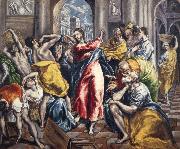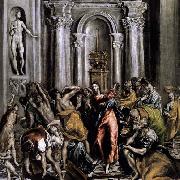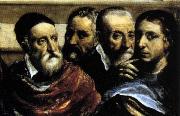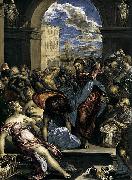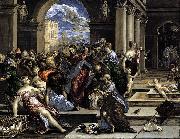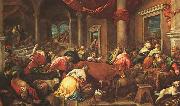Wholesale Oil Painting Reproductions No Minimum and Door to Door! |
|||||||||||
|
|
|||||||||||

|
|||||||||||
|
|
|
||||||||
All El Greco Oil Paintings |
||||||||
|
|
||||||||
|
|
||||||||
|
Artist Introduction: Greek-born Spanish Mannerist Painter, 1541-1614
Considered a representative of late Renaissance Spanish art, El Greco was actually born in Greece, on the island of Crete. After studying in Venice under Titian, El Greco settled in Toledo, Spain in 1577. At the time he was wildly popular, his emotionally religious paintings being just the ticket for the hometown of the Spanish Inquisition. After his death his work was largely ignored until the beginning of the 20th century; now he considered one of the inspired geniuses of Western art. His distinctive style features bold shapes and colors, with elongated and slightly distorted figures.
In Toledo El Greco was in constant demand and liked living large: he maintained a private orchestra to accompany his meals. |
||||||||
|
|
||||||||
|
The Purification of the temple Painting ID:: 31750 |
mk76
Painted
c.1600
Oil on canvas
16 1/2x20 5/8in
|
|||||||
Height Width |
INS/CM Quality |
|||||||
|
X |
| |||||||
|
|
||||||||
All El Greco Oil Paintings |
||||||||
|
|
||||||||
|
|
||||||||
|
Artist Introduction: Greek-born Spanish Mannerist Painter, 1541-1614
Considered a representative of late Renaissance Spanish art, El Greco was actually born in Greece, on the island of Crete. After studying in Venice under Titian, El Greco settled in Toledo, Spain in 1577. At the time he was wildly popular, his emotionally religious paintings being just the ticket for the hometown of the Spanish Inquisition. After his death his work was largely ignored until the beginning of the 20th century; now he considered one of the inspired geniuses of Western art. His distinctive style features bold shapes and colors, with elongated and slightly distorted figures.
In Toledo El Greco was in constant demand and liked living large: he maintained a private orchestra to accompany his meals. |
||||||||
|
|
||||||||
|
|
The Purification of the Temple Painting ID:: 52662 |
after 1610 Oil on canvas, 106 x 104 cm |
||||||
Height Width |
INS/CM Quality |
|||||||
|
X |
| |||||||
|
|
||||||||
All El Greco Oil Paintings |
||||||||
|
|
||||||||
|
|
||||||||
|
Artist Introduction: Greek-born Spanish Mannerist Painter, 1541-1614
Considered a representative of late Renaissance Spanish art, El Greco was actually born in Greece, on the island of Crete. After studying in Venice under Titian, El Greco settled in Toledo, Spain in 1577. At the time he was wildly popular, his emotionally religious paintings being just the ticket for the hometown of the Spanish Inquisition. After his death his work was largely ignored until the beginning of the 20th century; now he considered one of the inspired geniuses of Western art. His distinctive style features bold shapes and colors, with elongated and slightly distorted figures.
In Toledo El Greco was in constant demand and liked living large: he maintained a private orchestra to accompany his meals. |
||||||||
|
|
||||||||
|
|
The Purification of the Temple Painting ID:: 62290 |
1571-76 Oil on canvas Institute of Arts, Minneapolis The most significant iconographic feature of this version is the introduction in the lower right-hand corner four portraits of artists. They are, from left to right, Titian, Michelangelo, Giulio Clovio and Raphael (although it has also been suggested that this figure is El Greco himself, Giulio Romano or even Correggio). Their presence can be interpreted as a straightforward homage by El Greco to those artists to whom he felt indebted (and some of whose works he was quoting in the picture). |
||||||
Height Width |
INS/CM Quality |
|||||||
|
X |
| |||||||
|
|
||||||||
All El Greco Oil Paintings |
||||||||
|
|
||||||||
|
|
||||||||
|
Artist Introduction: Greek-born Spanish Mannerist Painter, 1541-1614
Considered a representative of late Renaissance Spanish art, El Greco was actually born in Greece, on the island of Crete. After studying in Venice under Titian, El Greco settled in Toledo, Spain in 1577. At the time he was wildly popular, his emotionally religious paintings being just the ticket for the hometown of the Spanish Inquisition. After his death his work was largely ignored until the beginning of the 20th century; now he considered one of the inspired geniuses of Western art. His distinctive style features bold shapes and colors, with elongated and slightly distorted figures.
In Toledo El Greco was in constant demand and liked living large: he maintained a private orchestra to accompany his meals. |
||||||||
|
|
||||||||
|
|
The Purification of the Temple Painting ID:: 85254 |
Date c. 1570(1570)
Medium Oil on poplar
cjr |
||||||
Height Width |
INS/CM Quality |
|||||||
|
X |
| |||||||
|
|
||||||||
All El Greco Oil Paintings |
||||||||
|
|
||||||||
|
|
||||||||
|
Artist Introduction: Greek-born Spanish Mannerist Painter, 1541-1614
Considered a representative of late Renaissance Spanish art, El Greco was actually born in Greece, on the island of Crete. After studying in Venice under Titian, El Greco settled in Toledo, Spain in 1577. At the time he was wildly popular, his emotionally religious paintings being just the ticket for the hometown of the Spanish Inquisition. After his death his work was largely ignored until the beginning of the 20th century; now he considered one of the inspired geniuses of Western art. His distinctive style features bold shapes and colors, with elongated and slightly distorted figures.
In Toledo El Greco was in constant demand and liked living large: he maintained a private orchestra to accompany his meals. |
||||||||
|
|
||||||||
|
|
The Purification of the Temple Painting ID:: 92136 |
1570(1570)
Medium oil on poplar
Dimensions Height: 65 cm (25.6 in). Width: 83 cm (32.7 in).
cyf |
||||||
Height Width |
INS/CM Quality |
|||||||
|
X |
| |||||||
|
|
||||||||
All Jacopo Bassano Oil Paintings |
||||||||
|
|
||||||||
|
|
||||||||
|
Artist Introduction: Italian
c1510-1592
Jacopo Bassano Gallery
He was apprenticed to his father, with whom he collaborated on the Nativity (1528; Valstagna, Vicenza, parish church). In the first half of the 1530s Jacopo trained in Venice with Bonifazio de Pitati, whose influence, with echoes of Titian, is evident in the Flight into Egypt (1534; Bassano del Grappa, Mus. Civ.). He continued to work in the family shop until his fathers death in 1539. His paintings from those years were mainly altarpieces for local churches; many show signs of collaboration. He also worked on public commissions, such as the three canvases on biblical subjects (1535-6; Bassano del Grappa, Mus. Civ.) for the Palazzo Communale, Bassano del Grappa, in which the narrative schemes learnt from Bonifazio are combined with a new naturalism. From 1535 he concentrated on fresco painting, executing, for example, the interior and exterior decoration (1536-7) of S Lucia di Tezze, Vicenza, which demonstrates the maturity of his technique. |
||||||||
|
|
||||||||
|
|
The Purification of the Temple Painting ID:: 95752 |
1580
Medium oil on canvas
Dimensions 158.7 x 265 cm.
cyf |
||||||
Height Width |
INS/CM Quality |
|||||||
|
X |
| |||||||
|
|
||||||||
|
Prev Next
|
||||||||
|
|
||||||||
|
Related Paintings to Jacopo Bassano :. |
||||||||
|
|
||||||||
|
CONTACT US |
